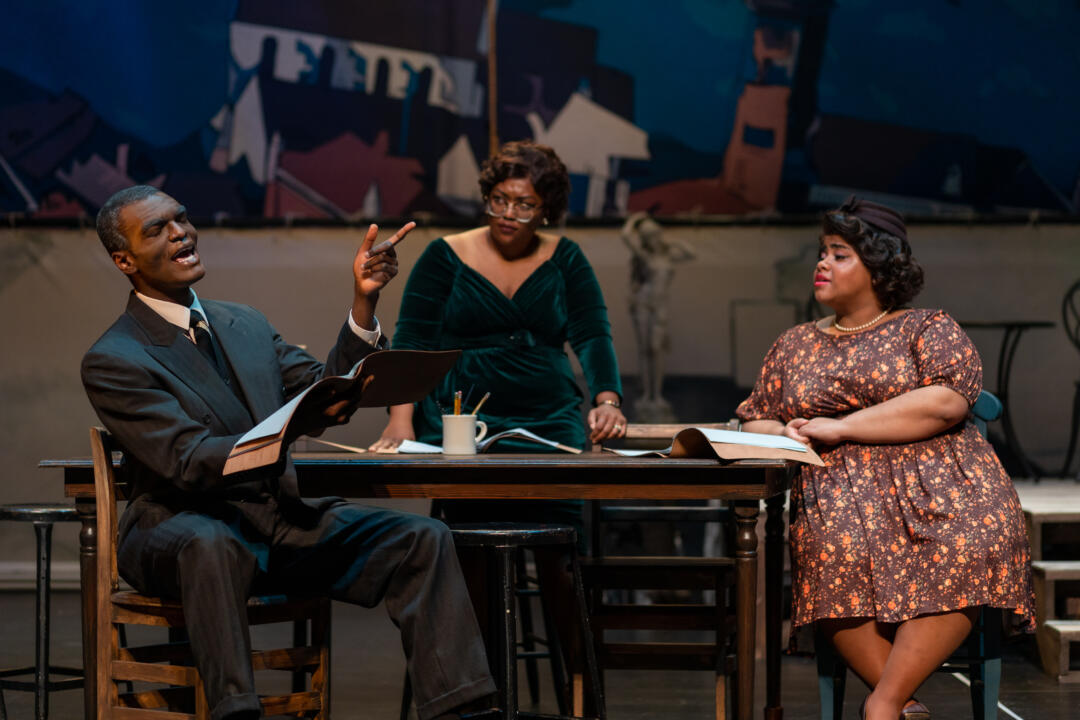An elderly gentleman named Henry, played by Sophomore Acting BFA, Lukas O’Boyle, enters an empty, dark Broadway theater. We come to recognize him as the doorman. He lights up the stage slowly, and 1950s jazz music plays.
This is how we come to know we have been transported to a Broadway theater in New York City, 1957.
Directed by Professor and Theater Professional, Danielle A. Drakes, and written in 1956 by Alice Childress, Trouble in Mind tells the story of the fight for truth, representation and self-worth during the trying times of the 1950s through the perspective of Black theater artists.
Willetta Mayer, played by Sophomore Theatre major Franchesca Parker, is a seasoned African-American performer who deals constantly with racism in the industry. After twenty-five years of conforming to societal expectations, getting boxed into lesser valued roles with overt racism attached, and now rehearsing under the authority of a tone-deaf white director, Al Manners, who is played by Duncan McAdam, tensions brew.
This play-within-a-play pushes audiences into having complex conversations and emotions that are still prevalent today. The racial slurs, descriptive language and different truths of what it means to be African-American are not held back. The story of Trouble in Mind is just as captivating, bold and memorable as every single cast member’s performance.
Willette is the first to arrive for rehearsal. She is then joined by a rookie hoping to make his debut, John Nevins, played by junior Theatre major, Marlon Brown, Jr.; Millie Davis, a luxurious, sharp woman who wants but has difficulty obtaining better spotlight roles, played by Senior Theatre and Africana Studies major, Niara Taylor; Judy Sears, a gullible white actress hoping to make her debut, played by sophomore Acting BFA major, Madison Sims; Sheldon Forrester, an elderly actor who tirelessly avoids conflict, played by Iffy Alachebe; Eddie Fenton, Al’s anxious white stage manager, played by junior Theatre and Music major Cece Smith; and finally Bill O’Wray, a white actor blind to his privilege, played by Anthony Wisdom.
The African-American characters of Trouble in Mind all exemplify different stages of life and career. The older Willetta and Sheldon advise upcoming actors on how to behave in the white-centered industry with differing views. They shared their coping mechanisms with the upcoming actors, encouraging them to take what is given to them and to play off any indiscretions against them as just another acting role.
Take it or leave it, upcoming actor John soon discovers the kind of play he is in for. It is a performance that justifiably pushes Willetta over the edge, despite what coping mechanisms she and the other Black actors have built into their careers.
There is no denying that the cast’s chemistry in Trouble in Mind is tight-knit. Even as they navigate a dangerous and devastating world, there remains a feeling of comfort and understanding among everyone. Students at the University of Maryland, Baltimore Country brought the story together beautifully. Phenomenal acting and stage presence, set design, lighting and costumes blended to make an immersive, transportive experience. Even with the heavy subject matter, the humor did not disappoint in carrying the message. Throughout the show, the audience laughed and cheered. A standing ovation was inevitable at the end.
Friday’s performance was followed by an Actor Talk-Back, a session for budding actors as well as any interested participant to directly talk to the actors about their methods and techniques for Trouble in Mind.
A student from the audience asked the panel of actors, “What is something you had to do specifically for your character that you hadn’t done before?” Cece Smith responded, “Acting with my back.” (Smith’s back was turned towards the audience for the majority of the play.)
Her character, Eddie Fenton, sat in front of the audience operating the sound tape in accordance with the rehearsal. Cece added, “It taught me about being present when I’m not on stage”.
With Cece’s answer and many more, the session gave testament to the actors and the immense work they put into creating and transporting Alice Childress’ story to a UMBC stage.
Trouble in Mind ran from Thursday, November 3rd to Sunday, November 13th at UMBC’s Proscenium Theatre with a concluding CIRCA Panel Discussion: To See or Not to See: Acting and Truth in Alice Childress’ Trouble in Mind.
Bolu Adeniran is a senior Cinematic Arts major working as a staff reporter for Arts & Culture. Contact Bolu at badenir@umbc.edu.


